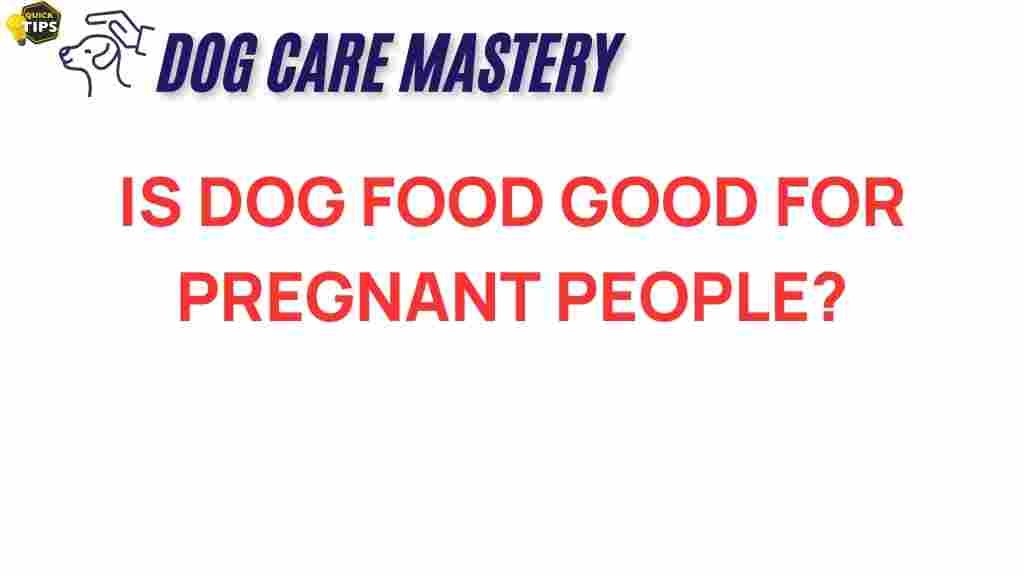The Curious Case of Canine Cuisine: Is Dog Food Safe for Pregnant People?
As the world of nutrition evolves, many people are increasingly curious about what they consume. This extends even to the realm of pet food, which has led to a rather eyebrow-raising question: Is dog food safe for pregnant people? In this article, we will explore the safety, nutritional aspects, and potential risks associated with eating dog food during pregnancy. With the focus on dog food, we will analyze its ingredients, benefits, and the implications it can have on both pregnant individuals and their babies.
Understanding Dog Food
Dog food is specifically formulated to meet the nutritional needs of dogs. It typically contains a mixture of proteins, carbohydrates, fats, vitamins, and minerals designed to support canine health. However, as humans, our nutritional requirements differ significantly. Before considering dog food as a dietary option during pregnancy, let’s delve deeper into what it contains.
Ingredients in Dog Food
Dog food varies widely in terms of quality and ingredients. Here are some common components you might find:
- Proteins: Often sourced from meat, fish, or plant materials.
- Carbohydrates: Grains like corn, rice, or potatoes are common.
- Fats: Animal fats or vegetable oils are included for energy.
- Vitamins and Minerals: Essential for maintaining health, these are added in specific ratios.
While some of these ingredients can be beneficial, others may not be suitable for human consumption, especially for pregnant individuals.
Is Dog Food Safe for Pregnant People?
The short answer to this question is: it depends. Here are some critical factors to consider:
Risk of Contamination
Dog food is not subject to the same regulatory scrutiny as human food. This poses a risk for contamination with harmful bacteria such as:
- Salmonella
- Listeria
- Escherichia coli (E. coli)
Pregnant individuals are particularly susceptible to foodborne illnesses, which can lead to serious complications. Therefore, consuming dog food can pose significant health risks.
Nutritional Imbalances
While dog food could theoretically provide some nutrients, it lacks essential components that pregnant individuals need, such as:
- Higher levels of folic acid
- Increased calcium and iron
- Omega-3 fatty acids
These nutrients are crucial for fetal development and maternal health. Relying on dog food could lead to nutritional deficiencies.
Potential Allergens
Some ingredients in dog food may not be suitable for humans. Common allergens like grains, beef, or chicken could trigger reactions, which can complicate pregnancy even further.
Emotional and Psychological Factors
Choosing to consume dog food could reflect a deeper emotional or psychological issue, such as stress or anxiety related to pregnancy. If you or someone you know is considering this, it might be worth speaking with a healthcare provider or a mental health professional.
What If You Accidentally Consume Dog Food?
Accidents happen! If you’ve accidentally consumed dog food while pregnant, here’s what you should do:
Step-by-Step Process for Handling Accidental Consumption
- Stay Calm: Panicking won’t help. Take a breath and assess the situation.
- Check Ingredients: Look at the label to understand what you ingested.
- Monitor Symptoms: Be alert for any unusual symptoms like nausea, vomiting, or diarrhea.
- Consult a Healthcare Provider: If you experience any adverse effects, contact your doctor immediately.
Common Symptoms to Watch For
Be mindful of the following symptoms:
- Gastrointestinal discomfort
- Fever
- Rashes or allergic reactions
If any of these symptoms arise, seek medical attention right away.
Alternatives to Dog Food During Pregnancy
Instead of relying on dog food for nutrition, consider these safe alternatives:
Human-Friendly Nutritional Options
- Fruits and Vegetables: Rich in vitamins and fiber.
- Lean Proteins: Chicken, fish, and legumes can provide necessary nutrients.
- Whole Grains: Foods like quinoa, brown rice, and oats are excellent energy sources.
- Dairy Products: Cheese, yogurt, and milk offer calcium and protein.
For more information on safe foods during pregnancy, visit CDC’s pregnancy nutrition page.
Consulting a Nutritionist
If you have concerns about your diet during pregnancy, consulting a nutritionist can provide tailored advice. They can help create a balanced meal plan that meets your nutritional needs.
Conclusion
In summary, while the idea of consuming dog food may seem curious, it is not safe for pregnant individuals. The risks posed by contamination, nutritional imbalances, and potential allergens outweigh any perceived benefits. Instead, it is crucial to focus on a balanced diet rich in human-friendly foods to support both maternal and fetal health.
If you or someone you know is struggling with dietary choices during pregnancy, don’t hesitate to reach out for professional help. Remember, proper nutrition is vital for a healthy pregnancy.
For further reading, consider checking out more articles on pet nutrition and how it differs from human nutrition.
This article is in the category Nutrition and created by dogcaremastery Team
